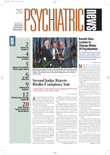The cognitive and memory devastation of Alzheimer’s disease gets a lot of publicity. But there is another symptom of the disease that can take even more out of the families of Alzheimer’s patients. And that is sleep disturbance.
Caretakers often find that looking after patients who wake up at night and roam about is so exhausting that they have to put the patients in a nursing home to save their own health and sanity.
A possible explanation for Alzheimer-provoked sleep disturbances may now have been identified by David Harper, Ph.D., of McLean Hospital in Belmont, Mass., and his coworkers. It is out-of-whack circadian rhythms.
Indeed, both the peak in daily body temperature and the peak in daily spontaneous motor activity—two yardsticks of daily circadian rhythms—were found to be delayed in Alzheimer’s patients compared with healthy older subjects.
Harper and his team report these findings and the details of their study in the April Archives of General Psychiatry.
Harper and his colleagues first measured the daily body temperature patterns and the daily spontaneous motor activity patterns of 38 men with advanced dementia over a three-day period. They also measured the daily body temperature patterns and the daily motor activity patterns of eight healthy control subjects under comparable conditions. After all the patients with dementia died, which was on average about two years later, autopsies were performed to determine exactly what kind of dementia they had had. Twenty-three were found to have had Alzheimer’s disease, nine to have frontotemporal degenerative dementia, and six to have diffuse Lewy body disease with mixed Alzheimer’s or frontotemporal degenerative pathologies.
Harper and his colleagues then compared the daily body temperature patterns and daily spontaneous motor activity patterns that they had recorded in the 23 Alzheimer’s patients with those that they had recorded in the nine patients with frontotemporal degenerative dementia and also with those that they had recorded in the healthy control subjects. They wanted to know whether they could find any differences.
They could, it turned out.
The Alzheimer’s patients had experienced a delayed daily peak in body temperature and delayed daily peak in spontaneous motor activity compared with control subjects. But the frontotemporal patients had experienced another temperature-activity pattern. They showed a daily temperature peak similar to that of controls, but an activity peak earlier than that of controls. What’s more, Alzheimer’s patients had engaged in more nocturnal spontaneous motor activity than had either controls or frontotemporal patients.
Taken together, the findings suggest that disturbances in circadian rhythms underlie the sleep disturbances that Alzheimer’s patients experience.
The findings also have some practical implications. For one, the daily temperature and activity profiles noted by the researchers might prove of help in differential diagnosis—that is, in determining whether a demented patient has Alzheimer’s or frontotemporal degenerative dementia. For another, the findings might lead to some way of mitigating sleep disturbances in Alzheimer’s patients. In fact, Harper told Psychiatric News, “we have a proposal already in for funding to attempt to use light to shift the rhythms of Alzheimer’s patients back to a normal phase relationship with the environment.”
The study, “Differential Circadian Rhythm Disturbances in Men With Alzheimer Disease and Frontotemporal Degeneration,” is posted on the Web at http://archpsyc.ama-assn.org. ▪
